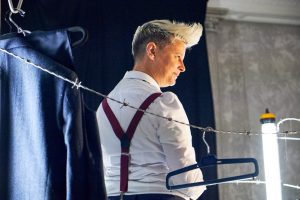How were we to know/ that when we were cleansing/ we were erasing our whole existence – CUNTO, Joelle Taylor

My whole life has been a protest, and my body a political placard. My body has also been a battleground and a bar room, a tourist spot and a cemetery, a haunted house and a roadside memorial. What it has rarely been is mine.
I hitched to Greenham Common Women’s Peace Camp from Lancashire several times in my teens, having read about the radical nature of a women-only protest. Founded by nuns who had walked from Wales to Berkshire to confront the cruise missile base, the camp became a homing signal for all of us badly written girls.
A furious mix of naive and brave, I turned up to Yellow Camp (main gate) aged 17 with nothing but a borrowed rucksack of rages, a notebook crowded with small black handwriting, and a pen. The pen is important. Think of it as the same one I write with now.
Greenham was far more than a peace protest for many of the dispossessed under-class women who made our way there. It was alive with possibility, mutable, irreverent, long-talking, kind, bad-mouthed and above all woman-focused. We were a new way of doing things, we were new things. I spent most of my time crouched in front of the fire, taking copious tiny handwritten notes and writing letters, or listening to elders talk about the first wave of feminism and CND. I was alive.
I spent most of my time crouched in front of the fire, taking copious tiny handwritten notes and writing letters
I can’t remember the names of the women who parented me at Greenham, but I do remember the cheap tent they erected for me, the blanket they found. I remember the quiet fire, and the crackle of conversation. I remember the plans for a changed world that showed us the shapes of our own mouths. I remember the long and freezing nights curled around ideas. I remember how we unpicked sections of the 9-mile wire perimeter fence as though it was a badly knitted jumper that needed reimagining.

My first direct political action involved cutting an opening in the perimeter fence over a number of days, taking care to tack-stitch it together again so the soldiers wouldn’t notice the base had been breached. Using wire cutters to slit a fence takes time, and so we divided the work between several of us, cutting it by increments. If we had tried to cut the whole opening in one go we would have been easily caught. On the appointed night of the action, seven of us quietly stole ourselves away from Yellow Gate into the surrounding woodland. We slept in the open and waited. At 4am we returned to the tacked opening, unpicked it and entered the base. We used blankets to help each other pass under the inner razor wire fence, until all seven of us were inside the facility, next to the runway. It was that easy to break into a high security nuclear missile base. This was one of our main points; if a group of 7 untrained women ranging from 17 to mid 70’s could break in, imagine what a militarily trained organisation could do. We made our way directly to the missile bunkers, carefully planted the saplings we’d brought with us and waited. I probably took the opportunity to hand roll and smoke a cigarette (which I also did while in the dock at my trial – irreverence for authority was a particular Greenham tactic, arguably natural to a group of little sisters and grandmothers). After far too long a time the soldiers came and aimed their rifles at us. We giggled. We could: we were all white.
Writing allowed me to put a thin piece of paper between myself and a world that did not want me there
We were arrested and taken to separate huts for interrogation, but all refused to speak. This is much more difficult than it sounds. Eventually I was charged under the 1984 Prevention of Terrorism Bill and was tried and sentenced in court.
Over the years, there were more actions and more arrests and detainments, but through it all was the pen. It seemed to me that I would always be safe if I had it with me, if I immediately wrote down what was happening and how. Writing allowed me to put a thin piece of paper between myself and a world that did not want me there.
From that point on poetry and political action have always walked beside each other for me. They are twins I sometimes have difficulty telling apart, in the same way that my politics and my body are linked.
The butch woman wears bare face and short hair not to accentuate a masculinity but to force a rethinking of what a woman is. Is she just clothes and make up? Really? In the 80’s it was a frightening thing to do, to stand there like that out in the open. And it helped us recognise each other, to form a strong and instinctive community. After Greenham we tribed together in dyke bars and art squats, still political by the simple act of being. We were kings of nothing much. To live outside the system is easy with a community such as this: no job, no fixed abode, no bank account. In the background were other activist groups; Act Up was ferocious in its defense of gay men and tackling prejudice around the AIDS epidemic, and the Lesbian Avengers staged protests, including abseiling into the House of Commons, and breaking into the live Nine O’Clock News. Culturally we had spaces where we could hang out, from bars to theatres and even Dyke TV on Channel Four.
Poetry and political action have always walked beside each other for me

Now that all of this lesbian-focused space has receded like the tide before a tsunami it is time for us to remember our journeys, our bodies, our friendships and how radical an act it was and still is for us to simply breathe.
My spoken word poem CUNTO is a way of breathing. It highlights the journey we masculine women, we butches, we gold star lesbians have taken. It speaks of the female body as a political act and focuses on one simple intent: the taking back of a body. It looks at homophobia and misogyny and talks about the community we forged to overcome the grief of our own lives. But it is also a celebration of the protests led by women from the 80’s through to mid-2000’s, and how much I owe them as a woman and as a writer.
Today writing has become my political act. The fact that I choose to write is political in itself. There is something about the contradiction between the potential longevity of words and the brief and unrepeatable act of performance that attracts me, that is radical at its core, and which proves to me that I am still alive.
See Joelle perform CUNTO as part of Rallying Cry | 28 & 29 May, 7.30pm | Albany, Deptford | info & booking
Banner photo: Suzi Corker
